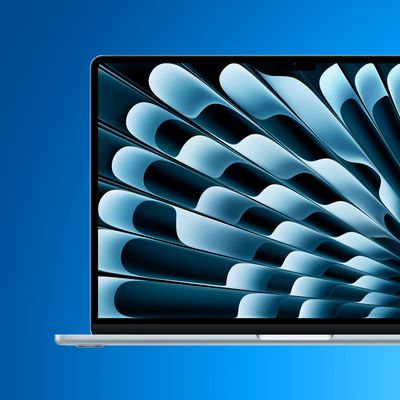Intel Looking to Cut Power Consumption on Future Ivy Bridge Chips
 CNET reports that Intel is hard at work on reducing the power consumption of its Ivy Bridge chips, opening the door to use of the chips in mainstream tablets and reducing battery needs on small notebooks such as the MacBook Air.
CNET reports that Intel is hard at work on reducing the power consumption of its Ivy Bridge chips, opening the door to use of the chips in mainstream tablets and reducing battery needs on small notebooks such as the MacBook Air.
Intel will cut power consumption "significantly" for future versions of the chip, an industry source familiar with the chipmaker's plans told CNET.
Intel's most power efficient Ivy Bridge chips today -- used widely in Windows ultrabooks and Apple's MacBook Air -- are rated at 17 watts.
A future version of Ivy Bridge would be rated well below this, the source said.
Intel has already previewed its next-generation Haswell chips that will push power consumption to as low as 10 watts initially, but it seems that Intel is moving to reduce power needs for its chips even before Haswell hits the market.
With future Ivy Bridge and Haswell chips becoming feasible for tablets with their reduced power consumption, there have been rumors that Apple could consider Intel chips for at least the iPad, although Apple seems dedicated to its own ARM-based chip designs for its mobile devices. But with Apple said to be looking to shift away from Samsung for production of its A-series chips, the company is said to be looking at TSMC and Intel as future chip foundry options.
In a research note issued last week, RBC analyst Doug Freedman claimed that Apple is already in talks with Intel on a deal that could see Intel producing A-series chips for the iPhone while Apple shifts to Intel's x86 platform for the iPad.
Popular Stories
Apple is not expected to release a standard iPhone 18 model this year, according to a growing number of reports that suggest the company is planning a significant change to its long-standing annual iPhone launch cycle.
Despite the immense success of the iPhone 17 in 2025, the iPhone 18 is not expected to arrive until the spring of 2027, leaving the iPhone 17 in the lineup as the latest...
Language learning app Duolingo has apparently been using the iPhone's Live Activity feature to display ads on the Lock Screen and the Dynamic Island, which violates Apple's design guidelines.
According to multiple reports on Reddit, the Duolingo app has been displaying an ad for a "Super offer," which is Duolingo's paid subscription option.
Apple's guidelines for Live Activity state that...
Apple is planning to release a low-cost MacBook in 2026, which will apparently compete with more affordable Chromebooks and Windows PCs. Apple's most affordable Mac right now is the $999 MacBook Air, and the upcoming low-cost MacBook is expected to be cheaper. Here's what we know about the low-cost MacBook so far.
Size
Rumors suggest the low-cost MacBook will have a display that's around 13 ...
Govee today introduced three new HomeKit-compatible lighting products, including the Govee Floor Lamp 3, the Govee Ceiling Light Ultra, and the Govee Sky Ceiling Light.
The Govee Floor Lamp 3 is the successor to the Floor Lamp 2, and it offers Matter integration with the option to connect to HomeKit. The Floor Lamp 3 offers an upgraded LuminBlend+ lighting system that can reproduce 281...
Now that the calendar has flipped over into January, steep discounts on popular Apple products have become more rare after the holidays. However, if you didn't get a new pair of AirPods recently and are looking for a model on sale, Amazon does have a few solid second-best prices this week.
Note: MacRumors is an affiliate partner with some of these vendors. When you click a link and make a...
Belkin today announced a range of new charging and connectivity accessories at CES 2026, expanding its portfolio of products aimed at Apple device users.
UltraCharge Pro Power Bank 10K with Magnetic Ring
The lineup includes new Qi2 and Qi2.2 wireless chargers, magnetic power banks, a high-capacity laptop battery, and USB-C productivity accessories, with an emphasis on higher charging...
Apple plans to introduce a 12.9-inch MacBook in spring 2026, according to TrendForce.
In a press release this week, the Taiwanese research firm said this MacBook will be aimed at the entry-level to mid-range market, with "competitive pricing."
TrendForce did not share any further details about this MacBook, but the information that it shared lines up with several rumors about a more...
With the release of iPadOS 26.2 and macOS Tahoe 26.2, Apple has improved the Wi-Fi speeds for select Macs and iPads that support Wi-Fi 6E. Updated Wi-Fi connectivity specifications are listed in Apple's platform deployment guide.
The M4 iPad Pro models, M3 iPad Air models, A17 Pro iPad mini, M2 to M5 MacBook Pro models, M2, M3, and M4 MacBook Air models, and other Wi-Fi 6E Macs and iPads now ...
 CNET reports that Intel is hard at work on reducing the power consumption of its Ivy Bridge chips, opening the door to use of the chips in mainstream tablets and reducing battery needs on small notebooks such as the MacBook Air.
CNET reports that Intel is hard at work on reducing the power consumption of its Ivy Bridge chips, opening the door to use of the chips in mainstream tablets and reducing battery needs on small notebooks such as the MacBook Air.






















